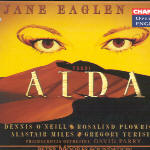Those who are crazy about either opera in English or Jane Eaglen will have to own this set; for most opera lovers, it simply does not have enough going for it to be recommendable. Eaglen is a known quantity–the voice is grand and appealing, and it is in Aida’s more extroverted moments that she shines. “Ritorna vincitor” is quite wonderful. But when intimate singing is required, the voice loses quality; rather than sounding soft and caressing, it sounds thin and unsupported. Rosalind Plowright was a thrilling, if not particularly Italianate soprano known for her dramatic interpretations. Here, in the unarguably mezzo role of Amneris, she is miscast. Much of the role requires big, from-the-chest singing and Plowright’s mid-voice is weakish and, well, un-mezzo-ish.
Dennis O’Neill remains a fine singer, always attentive to the text and adding insights to the role of Radames. But his voice is aging and he’s under strain both above the staff and above forte. He ends “Celeste Aida” softly, but I think the engineers had a hand in it as well. Gregory Yurisch is a thrilling Amonasro; rarely have I heard such single-minded revenge or nationalism from this fanatical character. The tone is big and exciting and he enlivens every scene he’s in. Peter Rose is a good Pharaoh, Alastair Miles a truly absorbing Ramfis, and Susan Gritton’s High Priestess is the best on disc.
David Parry’s leadership seems oddly off the mark here and he makes some strange tempo choices and awkward transitions. Could he be tailoring the music to his cast? The chorus and orchestra are very good. The translation is as stilted as the original Italian: “…then with a garland I would adorn you/build you a throne nearer to the sun!” sings Radames at the close of his opening aria, and we realize how far we are from Memphis and Thebes. The engineers seem to toy with the voices throughout, focusing on Eaglen in the first act trio and twirling knobs elsewhere as well. As I said, only for Englishlangophiles and Eaglenophiles.
































